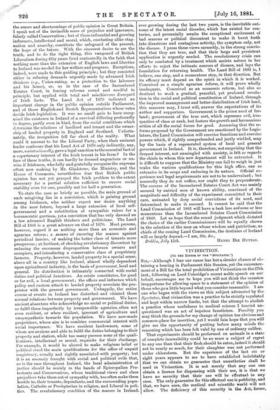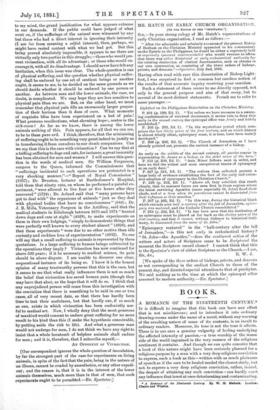VIVISECTION.
[TO THE EDITOR OF THE 'SPECTATOR.") SIR,—Although I fear our cause has but a slender chance of ob- taining a hearing in Parliament this Session, yet the announce- ment of a Bill for the total prohibition of Vivisection on the 27th. inst., following on Lord Coleridge's recent noble speech on our behalf, encourages me to hope you will not think the occasion inopportune for allowing space to a statement of the opinion of those who go a little beyond what you consider reasonable. I am one who began with the views on this subject advocated by the- Spectator, that vivisection was a practice to be strictly regulated and kept within narrow limits, but that the attempt to abolish a practice whose usefulness to medical science I fancied un- questioned was an act of hopeless fanaticism. Possibly you may think the grounds for my change of opinion too obvious and common-place for insertion, yet I would fain hope that you will give me the opportunity. of putting before many minds the- reasoning which has been felt valid by one of ordinary calibre.
That experiments should be performed on animals in a state of complete insensibility could be no more a subject of regret to any one than that their flesh.should be eaten, indeed it should, not be nearly so much, for their slaughter was not performed under chloroform. But the experience of the last six or- eight years appears to me to have established indubitably that we can obtain no guarantee that antesthetics shall he- lloed in Vivisection. It is not merely that any one can obtain a licence for dispensing with their use, it is that we have no security that their use will be effectual in any case. The only guarantee for this effectual use is publicity, and that, we have seen, the medical and scientific world will not allow. The deficiency of this security in the Act, forms,
to my mind,,the grand justification for what appears extreme in our demands. If the public could have jndged of what went on, if the sufferings of the animal were witnessed by any but those who had a direct interest in ignoring their intensity
(I am far from meaning a selfish interest), then, perhaps, we might have rested content with what we had got. But this being proved absolutely impossible, it appears to me there are virtually, only two parties in this struggle ;—those who would pre- vent vivisection, with all its advantage; or those who would en- courage it, with all its disadvantage. I should never have felt any hesitation, when this issue was clear. The whole question is one of physical suffering, and the question whether physical suffer- ing shall be endured by one set of sentient beings or another ought, it seems to me, to be decided on the same grounds as we should decide whether it should be endured by one person or another. As between man and the lower animals, the case, no doubt, is oemplioated. We may hope they are less sensitive to physical pain than we are. But, on the other hand, we must remember that physical pain fills an enormously larger propor- tion of their horizon than it does of ours. What moments -of exquisite bliss have been experienced on a bed of pain ! What precious recollections, what elevating hopes, centre in the sick-room ! As far as we know, there is among the lower animals nothing of this. Pain appears, for all that we can see, to be to them pure evil. I think, therefore, that the minimising of suffering ought to be something very great indeed to justify us in transferring it from ourselves to our dumb companions. Can we say that this is the case with vivisection ? Can we say that at a trifling suffering to dogs and cats, for instance, a great immunity has been obtained for men and women ? I will answer this ques- tion in the words or medical men. Sir William Fergnsson, surgeon to the Queen, informed the Commissioners that " sufferings incidental to such operations are protracted in a very shocking manner,"—" Report of Royal Commission" (1037) ; Dr. Brunton, lecturer at Bartholomew's Hospital, told them that ninety cats, on whom he performed a painful ex- periment,," were allowed to live four or five hours after they recovered" (5724) ; Dr. Acland said that "many persons have got to deal with" the organisms of animals "just as they deal with physical bodies that have no consciousness" (944); Dr. J. B. Mills, Veterinary Surgeon in the Artillery, said that the medical students in Edinburgh between 1870 and 1874 "hunted down dogs and cats at night" (4928), to make experiments on them in their own lodgings, "simply to demonstrate things that were perfectly well known to every student almost" (4926), and that these experiments "were due to no other motive than idle curiosity and reckless love of experimentation" (4932). No one will say that a small suffering to animals is represented by these quotations. Is a large suffering to human beings subtracted by the operations they imply ? Vivisection has now continued for above 200-years; if it be necessary to medical science, its gain should be above dispute. I am unable to discover one clear, Isnquestioned instance of its being so. I know it is the honest opinion of many trustworthy persons that this is the case, but it seems to me that what really influences them is not so much the belief that vivisection has saved, human pain (though they may have that also), as the hope that it will do so. I think that
any unprejudiced person will cease from this investigation with the conviction that there is something to be said in one or two cases, all of very recent date, so that there has hardly been
time to test their usefulness, but that hardly one, if so much as one, exists in which vivisection has been undeniably use- ful to medical art. Now, I wholly deny that the most generous
of mankind would consent to endure great suffering for no more result to his kind than this (I make the hypothesis conceivable,
brpntting aside the risk to life). And what a generous man would not undergo for men, I do not think we have any right to insist that a whole hecatomb of helpless animals shall endure for men ; and it is, therefore, that I subscribe myself,— As OPPONENT OF VIVISECTION.
[Our correspondent ignores the whole question of inoculation, by far the strongest part of the case for experiments on living animals, in spite of the fact that the pain, being in the nature of an illness, cannot he evaded by ana3sthetics, or any other expedi- ent ; and the reason is, that it is in the interest of the lower animals themselves, much more than in that of men, that such experiments ought to be permitted.—En. Spectator.]



































 Previous page
Previous page